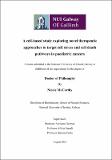| dc.contributor.advisor | Samali, Afshin | |
| dc.contributor.advisor | Gorman, Adrienne | |
| dc.contributor.author | McCarthy, Nicole | |
| dc.date.accessioned | 2020-10-27T11:58:26Z | |
| dc.date.available | 2020-10-27T11:58:26Z | |
| dc.date.issued | 2020-08-17 | |
| dc.identifier.uri | http://hdl.handle.net/10379/16234 | |
| dc.description.abstract | Paediatric cancer is the leading cause of death by disease in children. High mortality rates and long-term effects of conventional treatments suggest an urgent need for basic and translational research to allow treatment advancements. Endoplasmic reticulum (ER) stress and the unfolded protein response (UPR) have been implicated in pro-tumourigenic processes including development, survival and cell death evasion in numerous cancers. Inhibitor of Apoptosis (IAP) proteins are also important in cell death and survival signalling and are associated with tumour progression and survival in various cancers. In this thesis, the role of the UPR and IAPs in cancer cell survival, as well as their roles in response to anticancer treatments, were investigated. Firstly, we confirmed that UPR plays a pivotal role in rhabdomyosarcoma (RMS), a common childhood soft tissue sarcoma. The UPR promotes the survival of RMS and inhibition of IRE1 and PERK induced senescence and reduced growth in RMS cells. These data reveal that targeting UPR signalling is a potential therapeutic option for RMS. The cytotoxic effects of UPR inducers, alone or in combination with other anticancer drugs, on paediatric cancer cell lines were also examined. A range of ER stress inducers had cytotoxic effects on several paediatric cancer cell lines. An important discovery in this thesis was that Smac mimetics can have an opposing effect on ER stress-induced cell death in paediatric cancer cells. Smac mimetic BV6 resolved tunicamycin-induced ER stress and UPR signalling while also promoting pro-survival signalling through NF-κB in neuroblastoma cells. These data highlighted an important role of IAPs in the regulation of cellular stress responses. In summary, the findings in this thesis reveal the significance of the UPR and IAPs in survival and death signalling in paediatric cancer cells, while also highlighting the potential of the UPR modulation as a therapeutic strategy for paediatric cancers. | en_IE |
| dc.publisher | NUI Galway | |
| dc.rights | Attribution-NonCommercial-NoDerivs 3.0 Ireland | |
| dc.rights.uri | https://creativecommons.org/licenses/by-nc-nd/3.0/ie/ | |
| dc.subject | Endoplasmic reticulum stress | en_IE |
| dc.subject | unfolded protein response | en_IE |
| dc.subject | IRE1 | en_IE |
| dc.subject | PERK | en_IE |
| dc.subject | Apoptosis | en_IE |
| dc.subject | Inhibitor of apoptosis proteins | en_IE |
| dc.subject | Smac mimetics | en_IE |
| dc.subject | NF-kB | en_IE |
| dc.subject | cancer | en_IE |
| dc.subject | paediatric cancer | en_IE |
| dc.subject | rhabdomyosarcoma | en_IE |
| dc.subject | neuroblastoma | en_IE |
| dc.subject | Natural Sciences | en_IE |
| dc.subject | Biochemistry | en_IE |
| dc.title | A cell-based study exploring novel therapeutic approaches to target cell stress and cell death pathways in paediatric cancers | en_IE |
| dc.type | Thesis | en |
| dc.contributor.funder | Horizon 2020 | en_IE |
| dc.local.note | The unfolded protein response (UPR) is a stress response utilised in all cells. Inducing or inhibiting this response is a potential therapeutic strategy in cancer. In this thesis, UPR signalling was pharmacologically modulated to investigate its role in cell survival and cell death in paediatric cancer cell lines | en_IE |
| dc.local.final | Yes | en_IE |
| dcterms.project | info:eu-repo/grantAgreement/EC/H2020::MSCA-ITN-ETN/675448/EU/Endoplasmic Reticulum Stress in Health and Disease/TRAIN-ERS | en_IE |
| nui.item.downloads | 233 | |


